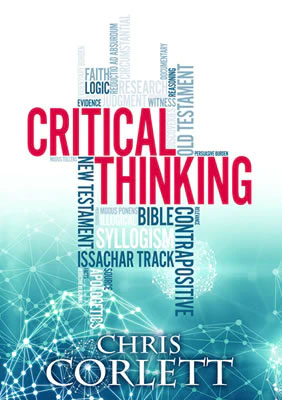In Critical Thinking1 the dual components of evidence and persuasion take prominent place in organizing or analyzing any position or claim. While evidence serves as the building blocks of any argument, persuasion operates as the mortar which connects and holds together each brick required to build the strong wall able to stand and withstand. Unpersuasive arguments – and unproductive conversations – frequently present themselves as either bricks-without-the-mortar or mortar-without-the-bricks.
Carl Sandburg is credited with saying, “If the facts are against you, argue the law. If the law is against you, argue the facts.”2 With any law comes a standard that must be met – for a murder conviction we are all familiar with the three-prong test of means, motive and opportunity. Many a murder movie developed a plot around the detective struggling to find that elusive motive. Without it, the district attorney will refuse to take the case to court.
Think back to a recent conversation with a friend over a controversial topic of philosophical, political, or personal consequence. Without knowing any details of your conversation, I suspect the champions of a particular claim or position either relied heavily on abundant evidence or double downed on persuasive rhetoric. Some cite a mountain of statistics and facts and objective data; others rely on narrative and storytelling. The former sees truth as objective and debate as a pursuit of the truth. The latter ‘– using a phrase like my truth – describes what some call subjective truth and present the argument in a persuasive and personal narrative.
Your mind may already be racing to specific topics hotly debated today and for this article I will use as an illustration a situation common to many of us, namely selecting a restaurant in town for a meal with a friend or the family. Some might rely on objective data like price, nutrition guidelines, number of parking spaces or typical ambient temperature. A majority (I suspect) rely on experience and “vibe” which are personal and subjective. “I always get great service there.” “The first time I went there was with my grandparents so many years ago.” “The food is the best.” Little evidence and no standard is presented for making the decision or the claim. This author recognizes this decision lacks weighty significance and its implications will only last until “second breakfast” or perhaps “elevenses3.”
In choosing the restaurant dilemma, I hope to avoid any unintended distress that you gracious reader might face with a more hotly debated issue. And as I write that, I can tell you that many a car conversation exiting the church’s parking lot started with the all-too-familiar exchange:
Peter: “Where do you want to go for lunch?”
Paul: “Wherever you want to go.”
Peter: “I am in the mood for pizza.”
Paul: “We had pizza last Sunday.”
Peter: “They serve food other than pizza.”
Paul: “So do other restaurants.”
Peter: “You said wherever I want to go.”
Paul: “Except not there!”
Selecting a restaurant is often a process of elimination – can I get a witness? And while I hope this paragraph produced a smile, smirk or an “lol” moment, I think I may have heard a groan or two as well!
The lack of a clear standard along with the absence of an authoritative arbiter makes restaurant selection a matter of tradition, determination or simply convenience. Sometimes it is the “squeaky wheel that gets the oil.” Other times, it is the one that nobody wants thereby satisfying in some odd way everybody. And this illustration serves as an example for much more compelling and consequential matters scrutinized in the court of public opinion, those headlines “above the fold”4 in legacy media as well as the posts on social media platforms.
We are called ambassadors of Christ5 who testify to all we encounter about the good news of repentance toward God and faith toward the Lord Jesus Christ.6 The lack of a recognized authority (the aforementioned arbiter) or a clear target (the shifting standard) makes any productive conversation elusive. Think back to that recent discussion or debate – who makes the final and binding decision and on what basis is this decision made? So often we fight to get in the last word thinking that means we won. Or the accusation of “moving the goalposts” identifies the sense of no real destination to achieve closure or compromise.
While the implied objective of any debate is to win the argument, this is not a regular experience, especially in these confusing times. I recall making a great argument to the legal counsel on the other side of the table in pursuit of a settlement of a disputed benefit. As I wrapped up my comments, the advocate looked at me and said, “That was a great argument. The answer is still ‘No!’ but that was a great argument.” My mind recalled the words of King Agrippa when he said to the apostle Paul, “You almost persuade me to become a Christian.”7
We hope at the close of our presentation for a look of resignation mixed with admiration to cross the face of our opposite. Rare indeed is the experience of Paul and Silas during which the Philippian jailer exclaimed, “Sirs, what must I do to be saved?”8 This brings us to the point of this article. In sports, there are referees / umpires / judges who make decisions and a clear standard of what is a penalty, a score and the like. So many conversations want to emulate this us versus them; win versus lose; good play versus penalty; and so on. This is simply not my experience (except maybe in my mathematics classroom!) and I have learned to rely on what is commonly referred to as the “Ask.” What am I asking of my listener?
- If I give you a book will you read it?
- Will you reconsider your position on the historical reliability of the resurrection of Jesus?
- Can I come back soon and we will continue the conversation?
As a professional, I am making an “ask” in countless meetings and conversations as well as being “asked” (tasked?) to do or consider some manageable activity. Since the early 1980’s, the S.M.A.R.T.9 goal acronym serves as a handy reminder that goals which are specific, measurable, attainable, relevant and time-bound are useful and effective in making progress. By incorporating an “ask” in the form of a “SMART goal” we can make progress in the critical conversations that are so important in these days.
The student asked the sage10, “How do you eat an elephant?” and the sage responded, “One bite at a time!” I ask that you re-read the familiar passage that follows and we will continue this conversation next time!
Who then is Paul, and who is Apollos, but ministers through whom you believed, as the Lord gave to each one? I planted, Apollos watered, but God gave the increase. So then neither he who plants is anything, nor he who waters, but God who gives the increase. Now he who plants and he who waters are one, and each one will receive his own reward according to his own labor.11
Notes:
1 Available for free download at: https://store.khouse.org/products/critical-thinking
4 https://en.wikipedia.org/wiki/Above_the_fold For the younger reader, this may invoke nothing more than a nostalgic moment captured in some old movie! The introduction of “swiping up” and “click bait” renders the above-the-fold practice as obsolete!
5 2 Corinthians 5:20
6 Acts 20:21 (this is my theme verse for 2021 – get it? – In 2021 I am focusing on Acts 20:21!)
7 Acts 26:28
8 A friend during my undergraduate years related just such a story and I have often wondered the backstory of this experience. And that is it – it has never happened to me personally!
10 https://www.brainyquote.com/authors/creighton-abrams-quotes based on a quote credited to General Creighton Abrams
11 1 Corinthians 3:5-8






